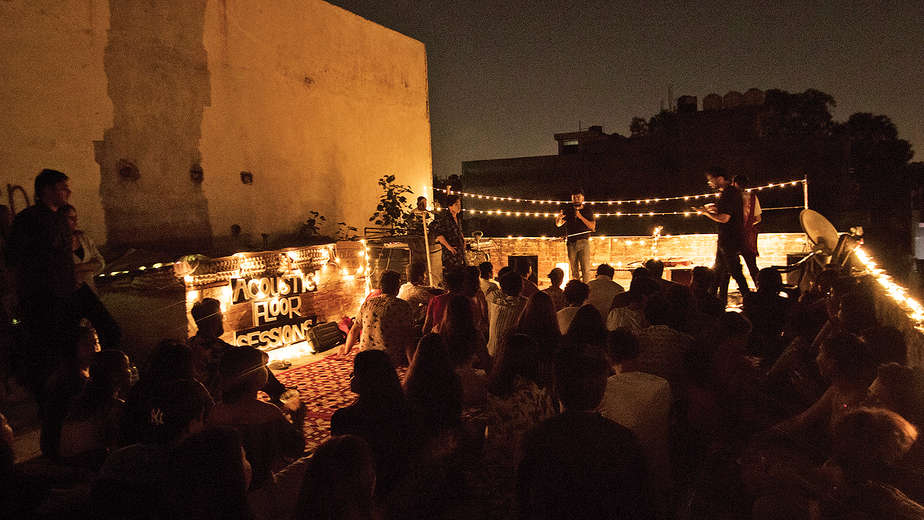
Imagine listening to acoustic music while sipping your favourite drink on a rooftop lit with fairy lights on a windy August evening. No, this is not a scene from some fancy club or a rooftop café. Taking music out of these places, live gigs in North Campus residences are bringing music closer to audiences.
Every resident of Delhi is familiar with North Delhi, which is home to countless university students. However serious they may be about academics, students always have energy for hanging out with their friends at night. Opportunities to listen to live music were few and far between here compared to the rest of the city. Coming to the rescue of their music-starved peers, three young students formed a start-up, Lines Media, which organises live gigs on rooftops.
Dedicated solely to acoustic music (no electric or electronic instruments), entry is limited to a small discerning audience. The first session held in May this year had no more than 35 people in the audience. Unlike other gig venues where sometimes the chatter of customers and din of bars overpowers the voice of the performers, these shows on terraces has a different ambience altogether.
“In the first session, we suggested everyone not only to switch off their phones or put them on silent but also drop them in the ‘submission box’,” says Manaskam Kakati, one of the organisers. This helps avoid any distraction which would take away the focus from the musicians. “Playing in front of a small audience who are busy on their phones hurts the morale of the musicians and is an insult to them. For an artist, what is most rewarding is undivided attention from the audience,” explains Kakati, who is a drummer himself. The idea is to give artists the respect they deserve.
In their second session, the audience exceeded the number of seats allotted but everyone clung on to phones — the pleasant surprise was that they did refrain from using their phones the entire session. The crowd was busy listening and grooving to music. “The crowd was very respectful and we took that as a sign of success on our part,” adds Kakati.
Promising unadulterated, undisturbed acoustic floor sessions, they have named it Benazir — the Urdu for incomparable. They prefer to avoid typical Bollywood music and their main idea is to promote independent music and artists. Keeping this in mind, they select the artist according to the musician’s performance video send to them. They also pick up some of the artists after watching them perform live. “We make sure to identify such promising artists and create an avenue for the to perform.”
Amlan Sarkar, one of the main artists, was picked up in a similar manner. Once the main section of performance is over, they conduct an open session where anyone from the crowd is welcome to play. Amlan was spotted after his performance in the open round from the first edition and was taken on board as one of the main artists in the second edition.
“There is a close to home feeling because everyone is really comfortable at the scene which makes me come back for each session. We also get to know artists whom we were not aware of,” says Anwesha Gogoi, a DU student who has attended both the sessions.
Spanning over three hours, the gigs consists of three sets of 40 minutes each. The music is a mix of both original compositions and covers. “Having a few covers in the sets makes it easy for the audience to relate and they do not end up getting bored,” says Kakati.
The second session hosted in August had a packed audience of around 85 people. Though the plan was to fill up 65 seats, they ended up with more people as the audience arrived with plus ones on the final day. Not being a formal event, they did not turn down anyone.
The tickets are priced at Rs 250, which includes refreshments. Keeping the prices relatively low allows students and others with less money to enjoy music which tends to be unaffordable at most other venues. “Most of the students miss out on gigs because of the expenses. We try to keep it as economical as possible,” explains Kakati.
“There are not many options in the North as compared to the South. In these events, the audience is genuinely interested in the music. Moreover, it was very well organised, affordable and also near our place. It was an evening well spent,” says Raj Laxmi, a student of Ambedkar University.
What clearly sets these gigs apart is the intimate listening session. Most often in bigger clubs the connection between the artists and the audience is difficult to establish. In contrast, the artists here come and sits with the audience after finishing with their set. They share their social media IDs, making it a complete informal experience.
Line Entertainment hopes to make it a monthly event, with the next scheduled for September. Right now, there are no plans to move out of the congenial North Campus region
Delhi hosted what organisers describe as the world’s first player auction in golf, launching ‘72…
An elderly woman recalls how her six-year-old granddaughter lay bleeding after a speeding car hit…
Municipal Corporation of Delhi plans a unified policy enabling RWAs to adopt and maintain parks…
A 17-year-old boy allegedly died by suicide after jumping before a moving train at Uttam…
Delhi High Court grants bail to 26-year-old Thar driver accused of mowing down two in…
Two Rohini men arrested for fatally stabbing one person and injuring another during a robbery…